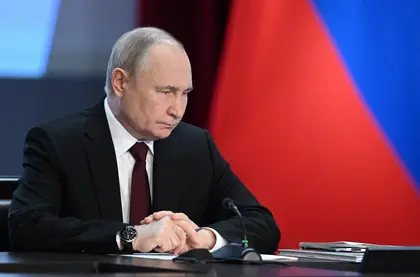As Putin enters his twenty-fourth year as president his regime appears stronger than ever: He has no political opponents, his population is deprived of news – replaced with Kremlin propaganda, and the 71-year-old dictator has survived the largest number of sanctions ever imposed on a country. However, increasingly there are signs that the Putin regime is beginning to crack, something which will be exacerbated by the precarious economic situation.
The projected forthcoming ruble devaluation and a lack of foreign currency are recipes for disaster. Russia’s sovereign national wealth fund has become increasingly dried up and no longer has US dollars, British pounds, or euros to balance the ruble whilst the quantity of Chinese yuan and gold are also diminishing.
Also striking at the core of the Russian economy is that oil refinery capacity is so significant that there are deficits of fuel – something that will only worsen as Ukraine continues to use drones to strike oil refineries across Russia. According to the US Treasury, 23 percent of the Russian budget is oil – and in mere weeks, thanks to Ukraine, as much as 15 percent of the nation’s total capacity for oil refinery has been lost.
Inside the sanctum of the Kremlin, it is unknown what exactly the oligarchical class is thinking. However, there are indirect signs that they feel that the Putin regime is on shaky ground.

Putin Vows ‘Destruction’ on Ukraine After Kazan Drone Attack
When Wagner Group’s Yevgeny Prigozhin made his run on Rostov last year, several important things happened: First, some of Putin’s top loyalists, including Dmitry Medvedev and Patriarch Kirill, were silent. Prudent enough to know that the winds of change may have arrived, they selected a “sit-it-out-and-wait” attitude to see what would transpire. Who would wish to condemn Prigozhin if he were on the threshold of seizing power, or to try to bolster Putin if he was now the walking dead?
Another key fact was the chartered flights that abandoned Moscow as Prigozhin advanced. It is unclear who was on some of the jets, but open source information indicated that at least two oligarchs and a senior government official was headed for the hills – not knowing if Prigozhin’s next stop might be Moscow.
Likewise, even the Russian military leaders who confronted Prigozhin in Rostov were not calling in airstrikes on the rebels – rather they stood outside and tried to persuade him to stop his march across Russia. Did they also fear that Prigozhin could next become their boss?
Putin himself, it is alleged, caught a flight to Valdai – 400 kilometers (250 miles) northwest of Moscow – showing that even he was not sure how things would play out.
Russian allies, including Iran and Kazakhstan, referred to Prigozhin’s coup attempt as “an internal matter of Russia,” seeking to distance themselves from what appeared to be the beginning of the end of Putin. Alarming for Moscow must be the realization that it has no allies upon whom it can count if it is facing an existential crisis.
Western nations also note a lingering instability in Russia. The White House is said to be concerned that ATACMS strikes on Crimea could destabilize Russia and that chaos could ensue as the Russian military imploded. A fear of collapse, following an attack, is a scenario reeking of instability. Normally, when a country is attacked, public support galvanizes in a phenomenon known as the “rally around the flag effect.” To imagine that rather than “rally,” Russians would run, is a sure-fire sign that things are not well at home.
It is highly unlikely that there will be a popular uprising in Russia. However, the natural brittleness associated with dictatorships (perhaps more apropos: like in criminal organizations) shows that leaders get killed when it behooves a faction that feels it will add to its own survivability.
The regime’s bogus announcement that Ukraine, in league with the US and UK, was behind the recent terrorist attack in Moscow, seems to have not been widely accepted within Russia, with some opposition groups saying that less than a quarter of citizens believed the narrative. Coming on the heels of Navalny’s murder and falsified elections that gave Putin nearly 88 percent, Russians increasingly see clear indications that their government has become distant from them, lying about things that are simply too far-fetched to believe.
The large protests that have broken out in Orsk, Russia included protestors allegedly yelling: “When there is a disaster in another country, Putin sends everything there. What about [our] region? Are we nobody?” Russians’ eyes are opening, perhaps, to the realization that they are getting a raw deal from their Kremlin leaders.
Given the weakness of the Putin regime, it is imperative that American policymakers accept that Putin will not rule forever, his day will come – perhaps sooner than we think. Thus, it is better to help push the fate of Russia in a direction that would be most beneficial to our interests.
Americans need to realize that not sending F-16s or ATACMS to Russia, based on the theory that it will prevent Russia from chaos, is nonsensical – and it costs Ukrainian lives. Putin took a big gamble to invade his sovereign neighbor. He alone is responsible should his downfall come due to the countermeasures taken to defend Ukraine and it would be a cautionary tale for future dictators to consider.
Putin’s regime is weakened: Let us not wait to see what happens. Rather, let us do all we can to help Ukraine win, and let the chips fall where they may.
You can also highlight the text and press Ctrl + Enter






